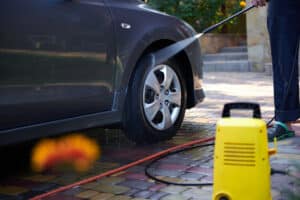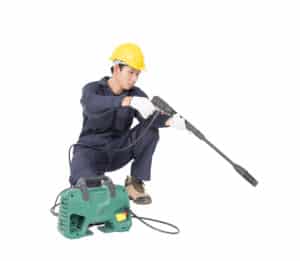Can I clean my car with a gasoline-powered pressure washer?
Key Takeaways
- Gasoline-powered pressure washers are generally too powerful for safe use on vehicles.
- Best practices for cleaning a car with a pressure washer include using the appropriate power and water flow, choosing the correct size nozzle, and rinsing the car before applying any cleaner.
- Pressure washing offers advantages over standard car cleaning methods, such as its effectiveness in removing stubborn dirt and grime, the ability to have control over the cleaning process, and the use of cold water to conserve energy.
Are you wondering if you can clean your car using a gasoline-powered pressure washer? The answer is yes, but with some precautions. While most gasoline-powered pressure washers are too powerful for safe use on vehicles, there are exceptions. In this article, we will explore the best practices for cleaning your car with a pressure washer, including the use of the Westinghouse 2700 PSI Gas-Powered Pressure Washer, which is specifically designed for safe and effective car cleaning.
The Pros and Cons of Using a Gasoline-Powered Pressure Washer
Before diving into the details of car cleaning with a pressure washer, let’s take a look at the pros and cons of using a gasoline-powered pressure washer on your vehicle.
Pros:
- High max pressure suitable for various power-washing jobs
- Rugged construction with a steel frame and large wheels for easy maneuverability
- Larger soap reservoir for bigger power-washing tasks
Cons:
- Some customers report the high-pressure hose is prone to bursting
- Gas-powered pressure washers are generally too powerful for safe use on vehicles
Based on these pros and cons, it is clear that while gasoline-powered pressure washers offer certain advantages, they may not be the ideal choice for cleaning cars due to their high power.
Best Practices for Cleaning a Car with a Pressure Washer
Now that we understand the limitations of gasoline-powered pressure washers for car cleaning, let’s explore the best practices for using any pressure washer to clean your vehicle.
- Use a pressure washer with the appropriate power (PSI) and water flow (GPM) for washing cars. This ensures that the pressure is not too high and the water flow is sufficient for effective cleaning.
- Choose the correct size nozzle for even and effective cleaning. Different nozzles provide different spray patterns, so select the one that suits your needs.
- Park the car in an open space, away from other objects. This allows for easy maneuverability and prevents any accidental damage.
- Rinse the car before applying any cleaner. This helps remove loose dirt and debris from the surface.
- Apply a cleaning detergent designed for pressure washers. These detergents are formulated to be safe for use with pressure washers and can effectively remove dirt and grime.
- Rinse off the detergent using a 40-degree tip and rinse from top to bottom. This ensures thorough cleaning without causing any damage.
- Dry the car with a towel or soft cloth if desired. This helps prevent water spots and gives a shiny finish to your car.
By following these best practices, you can safely and effectively clean your car using a pressure washer.
Pressure Washing vs. Standard Car Cleaning Methods
When it comes to car cleaning, pressure washing offers several advantages over standard methods. Let’s take a closer look:
- Pressure washing is more effective than standard car cleaning methods. The high-pressure water can penetrate deep into the crevices and remove stubborn dirt and grime.
- Drive-through car washes can transfer dirt and grime onto your car and may cause damage. Pressure washing allows you to have complete control over the cleaning process.
- Pressure washing uses cold water, while power washing uses heated water. Cold water is usually sufficient for car cleaning and helps conserve energy.
- Snow foaming is an important first step in the car washing process to remove dirt and grime. Using a foam cannon attached to a pressure washer, you can spray foamed detergent onto the car and let it sit for a few minutes before rinsing it off.
- Scrub the car using a sponge or wash mitt with a power washer soap solution. Avoid scrubbing in a circular motion to prevent swirl marks.
- Rinse the car frequently to avoid water spots, especially in hot weather. This ensures a clean and spotless finish.
- Pressure washing can reach under the car and clean hard-to-reach areas, providing a thorough cleaning.
- There are products specifically designed for pressure washing cars, such as those offered by CleanTools, which can enhance the cleaning process.
By utilizing pressure washing techniques and products, you can achieve a superior clean for your car.
Conclusion
In conclusion, while most gasoline-powered pressure washers are too powerful for safe use on vehicles, there are exceptions like the Westinghouse 2700 PSI Gas-Powered Pressure Washer that can be used to clean cars safely. However, it is crucial to follow the best practices outlined in this article to ensure effective and damage-free car cleaning. By using the appropriate pressure washer, selecting the right nozzles, and following the recommended steps, you can achieve a thorough and efficient clean for your car.
Related Websites:
FAQs:
Q: Can I clean my car with a gasoline-powered pressure washer?
Yes, you can clean your car with a gasoline-powered pressure washer. These machines offer high pressure and mobility, making them effective for removing dirt and grime. However, it’s important to follow safety guidelines and take precautions to avoid damaging the car’s paint or delicate parts.
Q: What are the benefits of using a gasoline-powered pressure washer for car cleaning?
Using a gasoline-powered pressure washer for car cleaning has several benefits. Firstly, it provides high pressure, allowing for effective removal of stubborn dirt and grime. Secondly, it offers greater mobility compared to electric pressure washers, making it easier to clean larger vehicles or reach remote areas. Lastly, gasoline-powered pressure washers don’t require an electrical outlet, offering more flexibility in where you can clean your car.
Q: Are there any drawbacks to using a gasoline-powered pressure washer for car cleaning?
While gasoline-powered pressure washers are effective for car cleaning, there are a few potential drawbacks to consider. The high pressure can pose a risk of damaging the car’s paint or delicate parts if not used correctly. Additionally, gasoline-powered machines may produce more noise and emissions compared to electric models. It’s important to take precautions and follow best practices to minimize these risks.
Q: What precautions should I take when using a gasoline-powered pressure washer to clean my car?
When using a gasoline-powered pressure washer to clean your car, it’s crucial to follow safety guidelines. Start by maintaining an appropriate distance between the nozzle and the car to avoid damaging the paint. Use a suitable nozzle for car cleaning, such as a wide-angle or low-pressure one. Also, choose gentle cleaning solutions suitable for automotive use. Always wear protective gear, such as safety goggles and gloves, and avoid spraying directly at sensitive parts or electrical components.
Q: What are some alternative methods for cleaning a car?
Apart from using a gasoline-powered pressure washer, there are alternative methods for cleaning a car. Traditional handwashing allows for precise control and can be gentle on the car’s surface. Automatic car washes offer convenience but may not provide thorough cleaning for heavily soiled vehicles. It’s important to consider the pros and cons of each method and choose what suits your needs and preferences best.





